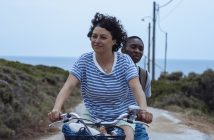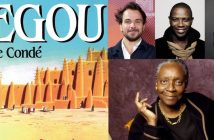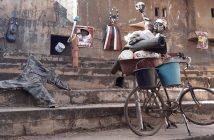Abderrahmane Sissako’s « Bamako », officially selected out-of-competition at the 2006 Cannes Festival, was such a success with the festival-goers that for the second screening, after more than an hour’s wait, many people didn’t make it into the fully-packed Salle Buñuel. On the same day, interview of the film director by two enthusiastic critics.
Women play a big role in the film: women lawyers, women witnesses, women in the courtyard
When I am making a film, I don’t try to put a theoretic vision into practice. I apply some devices that will make some realities or truths stand out on their own. I think this also goes for the women in Bamako, for the roles they play in the courtyard as well as in the trial and its hearing. Actually, they suffer more from the debated economical phenomena than men do. For me, all of this happens quite naturally. When I start a shoot, I barely know who will play who. Melé, the woman who sings, embodied by Aïssa Maïga, is a well-defined character, a written character, but not the others who assert themselves progressively, in the groups. Women’s strength is a reality. I watched those cloth dryers whom I’d specifically asked to come into the house’s courtyard to be part of the film’s scenography. They immediately got involved and took an interest in the trial, which was practically lived as a real trial for the people who were there. People listened to what was being said off-screen and the way they did it appealed to me. It’s this off-screen that I was trying to bring back on-screen everyday. When I saw them listening like this, I asked them to do it again the next day. They were often women.
Here again, we see your method which consists in writing a film during the shooting.
Yes, absolutely.
It’s a film that’s both empty and full: there are lots of characters and there are often very simple, nearly empty, shots. This alternation commands attention.
In the end, a film only really exists with its flaws, but we try advisedly to use everything that comes into its making: the atmosphere, the rhythm, the editing, the frame, the silence but also the noise. In a film like this one, where speech plays an important role, I think it’s necessary to leave it behind and move towards a meaningful silence. You have to be aware of the spectator; you need to care about him/her because he/she is doing a very generous thing by coming to see something he is a stranger to. In this exchange, I think it’s important to be aware and careful of not taking advantage of him and of giving him his space, but also space for a reflection which he may not grasp. This is probably the most head-on film, as regards to the discourse of the film, that I’ve made. I don’t really like that; it’s not in my nature. So I was careful to find a counterpoint at each moment. These needed to be understood by the Africans as well as by others. You can be in Africa and show solidarity like everyone does. Even if this Continent’s strength is its ability to share the little they have left with everyone. Even by living like that in a group, a man can be alone. Even suicide, which is always a desperate action, shows that a hand wasn’t held out at the right moment.
In this film that revolves around the word, speech is always questioned. « Anyway, they won’t listen », says the one whose interview is to be done again. The incantations at the trial show there are doubts about the use of talking.
It also reflects the artist’s desperate action. Why are we doing all this? What purpose is it going to serve in reality? I, myself, am not sure that the film will be seen. Of course, the artist wants to be seen or heard but, deep down in his conscience, there is something nearly desperate in his action even before taking it. It’s very difficult and that too creates solitude.
But there’s also this man who, at the beginning of the film, doesn’t want to wait before speaking
It shows the urgency of saying things. That’s why he doesn’t wait. He carries speech within him.
The same question is raised about the image that was raised by Jean-Christophe Klotz’s film « Kigali, des images contre un massacre »: a character wants to film the trial but he is forbidden to do so when official cameras are doing it. The contradiction concerns the image, how it is used and how it can have some influence.
Yes, completely. It’s also my way of saying that the government, meaning we, are not ready to talk about this, even if the government has allowed this trial and allows us to talk about it. It is maybe too early for this intruder to take his camera and film, for an individual to do it.
This really sounds like the photographer who surprisingly says that he takes pictures at weddings but prefers dead people!
This character is the author. Just like the policeman, who represents authority, forbids filming. It’s the government who’s not helping us and isn’t developing any welfare or cultural policies. This dialogue with the photographer prepares for Chaka’s death. I knew that this suicide would be violent. To diminish this violence, you need to prepare it; it needs to be possible in your subconscious. Some phrases you never forget. In a way, Falaï comes with his camera like Death comes for Chaka.
What he films is magnificent in terms of respect for his subject. He makes a beautiful travelling shot on the close relations when static shots prevail throughout the rest of the film. It seems like a change of discourse.
No, we’re simply in a movement towards things, a statement. The suicide is static but the funeral ceremony needs harmony to grasp it.
The episode of the spaghetti-western is a real breath in the film and widens its discourse. Why did you make that choice?
Westerns mean a lot to me. Spaghetti-westerns were the first films to make me dream. But there’s also Le retour d’un aventurier (Return of an adventurer) by Mustapha Alassane, which I discovered at the same time. It made me understand that westerns are also possible here in our country. I was a child and I didn’t even know I was going to make films. And all of this was possible with the will to film my friends, who agreed to join the adventure. But apart from that, this western episode stages white and black cowboys, which means that the responsibility for what is happening on the continent is shared. One says to kill but who is shooting? We are not innocent as regards to what is happening to us.
But it’s also a question of trickery, a recurring notion in the film. We feel that there is a strong will to spell things out!
Absolutely. Westerns are like a World Bank or IMF mission. That’s how it really happens. Structural adjustment is seen as « good work ». And that’s where people’s misery and suffering is in the balance.
The heroes of the western all have their names in the credits, except for the character you play, Dramane Bassaro.
Dramane is the name the people in my family call me. Even in La vie sur Terre, when the postman talks on the phone with someone calling from France, he says that Dramane is here. Bassaro is my uncle’s name. I didn’t want to have my name up when I’m already the director and the scriptwriter.
What is the purpose of the gun theft?
It was for the inspector to find the lost gun, which would be used for Chaka’s suicide, which also prepares him, especially when he asks his wife if she has seen it. He only asks the fragile ones, the mute witness, the adventurer who tried to go from Morocco to Spain,etc. He targets those on the brink of the abyss. When you steal a gun, it’s to use it.
There really is no communication in Chaka and Melé’s couple.
Yes, we’ve come to that. I imagine that, at the beginning, it wasn’t like that of course. It’s also because Melé is Senegalese, she’s going back home. That’s the reality of a multiple and diverse Africa too. Melé is an immigrant.
Twice, she asks that someone tie the knot of her bodice in her back.
Yes, because she no longer has any intimacy with her husband.
The film mixes two contrasting aesthetic devices what with the trial and all of these shots that come in to illustrate it or widen its intention.
Yes. For the trial, people really spoke their minds. When I said « action », I could film for two hours; it was really like a real trial. There weren’t pre-defined lines. I just explained the situation to them and lawyers and witnesses played their part the way they wanted. It’s incredible: from the moment a person is faced with a President of the Court, he/she feels he/she is in a trial. Aminata Traoré acted like she was in a trial. The president played along with me because I’d asked him to reprimand those who didn’t behave! This made people very serious. They believed in this trial! During the breaks, the witnesses went to meet the lawyers of the private party associating with a public prosecutor, as if they really expected something out of this trial.
Danny Glover is not only in the western but also in the co-production
He is a committed man, passionate about Africa and injustice in general, and he is a man of action. I talked to him about my film project when we were in Amiens. He read the script and said he believed in it, that it was necessary and important to make it, that he supported me and he wanted to make a gesture. So he contributed financially to support the film. When I wanted to ask my friends to participate in the western, I asked him if he would and he said yes and played for free. He’s even the only one who bought his ticket to come all the way to Timbuktu!
Why does one of the characters learn Hebrew to be a guard at the embassy?
I’m learning it myself because I think it’s a beautiful language. I like the idea of « Easy Hebrew », when learning it is hard anyway. It could have been another language but when I was learning Lesson 41, which is « Under the street light », it was a meaningful lesson: when you’re aware of having lost your money over there but that you are looking for it here because it’s too dark over there, it reminds me of how Africa is being exploited and how it’s so complex that you can’t understand it! Even a Hebrew lesson is a political lesson!








